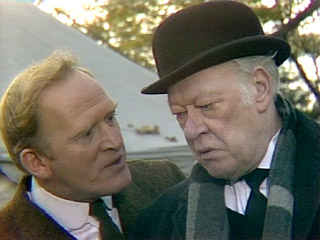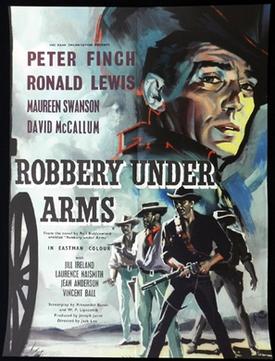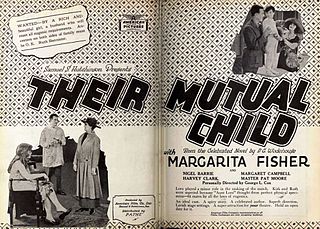
Franklin James Schaffner was an American film, television, and stage director. He won the Academy Award for Best Director for Patton (1970), and is known for the films Planet of the Apes (1968), Nicholas and Alexandra (1971), Papillon (1973), and The Boys from Brazil (1978). He served as president of the Directors Guild of America between 1987 and 1989.

Harvey Keitel is an American actor known for his portrayal of morally ambiguous and "tough guy" characters. He rose to prominence during the New Hollywood movement, and has held a long-running association with director Martin Scorsese, starring in six of his films: Who's That Knocking at My Door (1967), Mean Streets (1973), Alice Doesn't Live Here Anymore (1974), Taxi Driver (1976), The Last Temptation of Christ (1988), and The Irishman (2019).

Laurence Harvey was a Lithuanian-born British actor and film director. He was born to Lithuanian Jewish parents and emigrated to South Africa at an early age, before later settling in the United Kingdom after World War II. In a career that spanned a quarter of a century, Harvey appeared in stage, film and television productions primarily in the United Kingdom and the United States.
The year 1954 in film involved some significant events and memorable ones.

Virginia Lilian Emmeline Compton-Mackenzie,, known professionally as Fay Compton, was an English actress. She appeared in several films, and made many broadcasts, but was best known for her stage performances. She was known for her versatility, and appeared in Shakespeare, drawing room comedy, pantomime, modern drama, and classics such as Ibsen and Chekhov. In addition to performing in Britain, Compton appeared several times in the US, and toured Australia and New Zealand in a variety of stage plays.
George Axelrod was an American screenwriter, producer, playwright and film director, best known for his play The Seven Year Itch (1952), which was adapted into a film of the same name starring Marilyn Monroe. Axelrod was nominated for an Academy Award for his 1961 adaptation of Truman Capote's Breakfast at Tiffany's and also adapted Richard Condon's The Manchurian Candidate (1962).
Charles Alfred Selwyn Bennett was an English playwright, screenwriter and director probably best known for his work with Alfred Hitchcock.

Matilda Alice Powles, Lady de Frece was an English music hall performer. She adopted the stage name Vesta Tilley and became one of the best-known male impersonators of her era. Her career lasted from 1869 until 1920. Starting in provincial theatres with her father as manager, she performed her first season in London in 1874. She typically performed as a dandy or fop, also playing other roles. She found additional success as a principal boy in pantomime.

Henry William George Lupino professionally Lupino Lane, was an English actor and theatre manager, and a member of the famous Lupino family, which eventually included his cousin, the screenwriter/director/actress Ida Lupino. Lane started out as a child performer, known as 'Little Nipper', and went on to appear in a wide range of theatrical, music hall and film performances. Increasingly celebrated for his silent comedy short subjects, he is best known in the United Kingdom for playing Bill Snibson in the play and film Me and My Girl, which popularized the song and dance routine "The Lambeth Walk".
Herbert William Compton Bennett, better known as Compton Bennett, was an English film director, writer and producer. He is perhaps best known for directing the 1945 film The Seventh Veil and the 1950 version of the film King Solomon's Mines, an adaptation of an Allan Quatermain story.

Clive Morton was an English actor best known for playing upper class Englishmen, he made many screen appearances, especially on television. In 1955, he appeared in Laurence Olivier's Richard III and is recalled by fans of Doctor Who for his role as prison governor George Trenchard in The Sea Devils in 1972. He played Commander Julius Rogue in the first series of the fondly-remembered children's TV series Rogue's Rock in 1974. One of his last roles was as an aged butler in an episode of Upstairs Downstairs.
Sir Abraham Walter de Frece was a British theatre impresario, and later Conservative Party politician, who served as a Member of Parliament (MP) from 1920 to 1931. His wife was the celebrated male impersonator Vesta Tilley.

Patricia Kirkwood was a British stage actress, singer and dancer who appeared in numerous performances of dramas, cabaret, revues, music hall, variety and pantomimes. She also performed on radio, television and films. In 1954, BBC Television broadcast The Pat Kirkwood Show; she was the first woman appearing on British television to have her own series.
After the Ball may refer to:

Poet's Pub is a 1949 British comedy film directed by Frederick Wilson and starring Derek Bond, Rona Anderson and James Robertson Justice. It is based on the 1929 novel of the same title by Eric Linklater. The film was one of four of David Rawnsley's Aquila Films that used his proposed "independent frame" technique. It was made at Pinewood Studios.

Robbery Under Arms is a 1957 British crime film directed by Jack Lee and starring Peter Finch and Ronald Lewis. It is based on the 1888 Australian novel Robbery Under Arms by Thomas Alexander Browne who wrote under the pseudonym Rolf Boldrewood.
Craig Kirkwood is an American lawyer and former actor. He is best known for his role as Jerry "Rev" Harris in the 2000 film Remember the Titans.

Woman to Woman is an all-talking sound 1929 British drama film with music directed by Victor Saville and starring Betty Compson, George Barraud and Juliette Compton. It is an adaptation of the 1921 play Woman to Woman by Michael Morton which had already been made in 1923 into a now-lost film. The 1929 version survives and unrestored copies are available on unofficial DVDs and streaming services.
Lauri de Frece was an English actor and singer who appeared in musical theatre and in films of the silent era. He was the younger brother of Walter de Frece and the husband of Fay Compton.

Their Mutual Child is a lost 1920 American silent comedy-drama film directed by George L. Cox and starring Margarita Fischer, Joseph Bennett and Margaret Campbell. It was based on the 1919 novel of the same title by P. G. Wodehouse.












